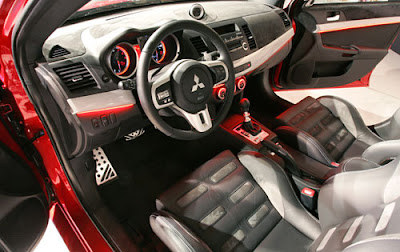
New turbo engine and trick all-wheel drive
The Evo uses the new Mitsubishi Lancer chassis, itself based on a platform originally developed in partnership with DaimlerChrysler. The Lancer is actually 0.6 inch shorter than before, but the wheelbase has been stretched 1.5 inches to 103.7 inches. The car is 2.7 inches wider and 3.8 inches taller. The chassis is more rigid in bending and torsion has improved more than 50 percent, but it's unfortunately also about 200 pounds heavier.
Mitsubishi engineers hope that an all-new turbocharged inline-4 will provide enough power to cope with the extra weight. Designated the MB11, this all-aluminum, DOHC 2.0-liter design has symmetrical cylinder dimensions, which should deliver free-revving performance. Mitsubishi's MIVEC variable-valve-timing technology has been applied to both camshafts to broaden the power band. Mitsubishi has also done its best to engineer this aluminum-block, open-deck engine to withstand the stress of turbocharging as well as the former iron-block 4G63 design.
Mitsubishi is remaining tight-lipped about power and torque figures from the turbo MB11 for now, but we expect horsepower to increase to 320 hp from 286, while torque will climb to 325 pound-feet from 295. This power should enable the Evo to sprint to 60 mph in less than 4.5 seconds.

More big news comes from the availability of a six-speed, dual-clutch transmission like Volkswagen's DSG unit. Shift paddles are mounted on the steering wheel, while a switch on the console delivers three different shift modes. For purists, a six-speed manual gearbox option will also be offered.
The Evo X's most significant piece of high-tech kit will be the addition of Mitsubishi's Super All Wheel Control (S-AWC) technology. It begins with the most elaborate form of the current Evo IX's all-wheel-drive system, which includes Active Center Differential (ACD), Active Yaw Control (AYC) and Active Stability Control (ASC). S-AWC adds active suspension, active braking control and active steering to enhance the Evo's AYC for quicker steering response and faster cornering speeds.
INTERIORS
Inside, the new cabin is a huge improvement over the current model's bland effort. New Recaro seats envelop the driver. (The suedelike inserts in the seat upholstery unfortunately are a feature only of the concept car.) Overall, the materials achieve a higher standard, although the design cues are much the same. A navigation system will be available, while the showcar features a premium sound system with a huge trunk-mounted subwoofer.
Inside, the new cabin is a huge improvement over the current model's bland effort. New Recaro seats envelop the driver. (The suedelike inserts in the seat upholstery unfortunately are a feature only of the concept car.) Overall, the materials achieve a higher standard, although the design cues are much the same. A navigation system will be available, while the showcar features a premium sound system with a huge trunk-mounted subwoofer.

Improved ergonomics also reward dedicated drivers, as the three-position switch that dials the center differential to different torque distribution settings for pavement, gravel and snow has been relocated from the dashboard to the steering wheel.
Meanwhile, Mitsubishi designers have employed soft, orange illumination for the instruments to enhance night vision. Unfortunately the concept car's suede upholstery for the dashboard and door panels won't make it to the assembly line.
The next STI The Evo X is expected to go on sale in Japan in September, with U.S. and European launches slated for early 2008. This new, larger and more sophisticated Evo X might not be the rally-bred car we remember, but its sophisticated all-wheel-drive performance should shame its competitors, whether they come from Europe or Japan.
No comments:
Post a Comment